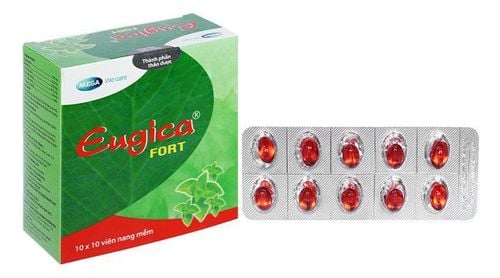The article was professionally consulted with MSc, Dr. Tran Mai Phuong - Pediatrician - Department of Pediatrics - Neonatology, Vinmec Central Park International General Hospital.
There are many causes of prolonged nasal congestion in young children, so parents need to have methods to monitor and care for their children, avoiding possible dangerous complications.
1. What causes prolonged nasal congestion in children?
Nasal congestion is a condition in which one or both nostrils are blocked by mucus or inflammation, making it difficult for children to breathe, sometimes breathing through the mouth. If the child is not treated, it will cause more dangerous complications and can lead to facial deformities.
There are many causes of prolonged nasal congestion in children, the first of which may be due to acute inflammation in the nose due to a viral infection (such as the flu). In this case, in addition to nasal congestion, children also have symptoms of sneezing, sore throat and cough.
Allergic rhinitis is the second most common cause of nasal congestion in children. Symptoms of allergic rhinitis in children include sneezing, a runny nose, and itchy eyes. A key characteristic of this condition is continuous sneezing accompanied by nasal congestion on both sides. Allergic rhinitis commonly occurs during pollen blooming seasons or can be persistent year-round due to triggers such as mold, house dust mites, cockroaches, pet hair, and dust.
Additionally, children may experience other types of rhinitis, including vasomotor rhinitis, gustatory rhinitis, and infectious rhinitis.

2. Consequences of Prolonged Nasal Congestion
If nasal congestion is left untreated for an extended period, it can lead to chronic conditions and respiratory complications. The severity of these complications depends on the underlying cause. For instance, if a child's nasal congestion is viral, possible complications include ear infections, bronchitis, and sinusitis.
In cases where the congestion is due to an infection, the child may experience hearing loss resulting from inflammation, swelling, and mucus buildup that blocks the passage between the nose and the ear. Prolonged rhinitis can also result in eye infections like dacryocystitis, conjunctivitis, and blepharitis. Moreover, persistent nasal congestion can lead to facial deformities, which may manifest as a narrow palate, protruding teeth, a jutting chin, or a sunken chest.
Beyond physical complications, a stuffy nose can significantly affect a child's daily life, leading to reduced energy levels, difficulties in concentration, frequent headaches, and decreased flexibility. If a child experiences long-term nasal congestion alongside yellow or green nasal discharge, headache, earache, high fever, severe cough, or chest pain, it is crucial to consult a doctor promptly.
3. Managing Long-Term Nasal Congestion
Long-term nasal congestion can negatively impact a child's health and quality of life, but with proper treatment, symptoms can improve. Parents can assist their children in managing nasal congestion through several strategies:
• Steam Therapy: Steaming or bathing the child in hot water can help alleviate nasal congestion temporarily, as steam helps thin mucus. This measure is only temporary, only reducing nasal congestion for a short time.
• Saline Nasal Spray: Using a saline spray can effectively reduce rhinitis and congestion. Parents can purchase sterile saline nasal spray from pharmacies or create a homemade solution with warm water and clean salt. This method also helps to clear mucus from the sinuses, making it easier to breathe. To ensure good results, the spray solution must be sterile and warm.
• Hot Compress: Applying a warm, damp towel to the affected areas can provide relief. However, it is essential to ensure the temperature is moderate to avoid burns.
• Essential Oils: Inhaling steam with a few drops of essential oil added can also ease breathing.
• Allergy Medications: If nasal congestion is allergy-related, appropriate allergy medications prescribed by a doctor can help. Parents should monitor dosages carefully and be aware of potential side effects to promptly notify the doctor.
• Decongestants: Some over-the-counter decongestants can be used in children to reduce nasal congestion. However, it is advisable to consult a pediatrician for an accurate diagnosis and usage instructions.

In addition, parents should also give their children enough water, because when the body is provided with enough water, it will reduce the thickness of mucus in the nose, push mucus out of the nose, reduce pressure in the sinuses, and reduce inflammation.
Children with prolonged nasal congestion can have many complications if not examined and treated early.
If home care remedies fail to provide relief, parents should seek medical attention for their children. Prolonged nasal congestion can lead to serious complications if not adequately addressed.
To support overall health and development, children need a balanced nutritional regimen. Inadequate and imbalanced nutrition can result in various health issues, including nutrient deficiencies, growth delays, and poor absorption. If parents observe signs of nutritional deficiencies, they should consider supplements containing lysine to support their child's needs. Proper nutrition is vital for a child's physical, mental, and motor development.
Children who do not eat properly are at risk of lacking micronutrients, causing anorexia, slow growth, poor absorption, etc. If you notice the above signs, parents should supplement their children with support products containing lysine, essential micronutrients and vitamins such as zinc, chromium, selenium, and B vitamins to help fully meet the nutritional needs of children. At the same time, these essential vitamins also support digestion, enhance the ability to absorb nutrients, help improve anorexia, and help children eat well.
Parents can learn more:
Signs of zinc deficiency in children
Micronutrient deficiency and poor weight gain in children
Please regularly visit the Vinmec.com website and update useful information to take care of your baby and your whole family.
To arrange an appointment, please call HOTLINE or make your reservation directly HERE. You may also download the MyVinmec app to schedule appointments faster and manage your reservations more conveniently.
To arrange an appointment, please call HOTLINE or make your reservation directly HERE. You may also download the MyVinmec app to schedule appointments faster and manage your reservations more conveniently.










